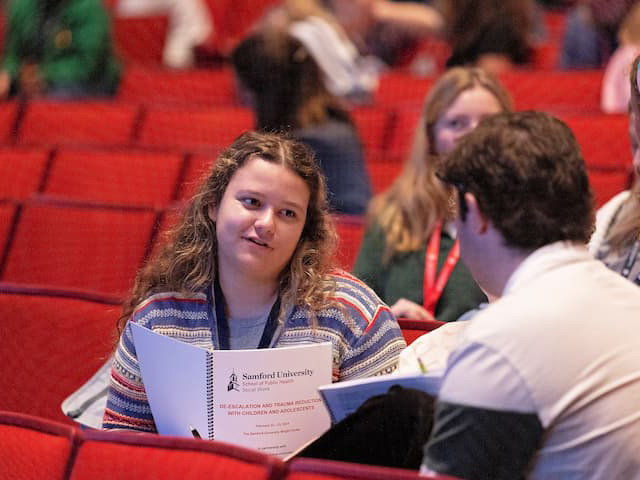
Samford University School of Public Health's Department of Social Work hosted a trauma and crisis de-escalation training on Feb. 22-23. Hundreds of Samford students, first responders, ministers, law enforcement and other area professionals gathered in the Leslie S. Wright Center to learn about supporting children and adolescents who have experienced a crisis or trauma.
"As professionals, sometimes our own emotions can influence the way we practice, so having those tips to be able to practice in a way to bring down our client's emotional state is really impactful," said Christa Chery, a Master of Social Work and Human Development and Family Science student.
This event was made possible by an Alabama Child Welfare Consortium grant. The School of Public Health partnered with Samford's Howard College of Arts and Sciences' Department of Psychology and Orlean Beeson School of Education's Department of Human Development and Family Science on this de-escalation event to expand their reach into the community.
"It gives us access to different partners, their resources and experience," said Jean Roberson, assistant professor in the Department of Social Work. "It also allows for professional conversations among students. The different perspectives they bring can make a difference in the lives of the people they serve."
With mass shootings and mental health issues on the rise and natural disasters occurring more than ever, organizers felt the need to host this training to ensure students are well-equipped to support youth in these situations after they graduate and settle into their careers.
"We wanted to provide an opportunity for skill development and additional opportunities for students to be involved," Roberson said. "We wanted students to understand where society is headed and how they can impact that in a positive way."
"As conversations about mental health become more popular, we're starting to recognize that the mental health of our youth is an important thing we must not neglect," Chery said. "As professionals, it's important to consider how we can move with the culture and times. So, I'm glad we have the opportunity to reflect on how the culture is celebrating and acknowledging the role of mental health and how we can contribute as social workers."
Throughout the two-day training, students attended seminars and heard from a panel of seasoned professionals who shared their expertise on crisis response within their respective fields. Caroline Ingraham, a junior psychology major, found the firsthand experiences of one speaker to be eye-opening.
"I appreciated his transparency about times where he messed up and where he could do better so we can learn from his mistakes," she said. "I couldn't put a price on that value. It's just incredible."
"To have experienced clinicians and law enforcement officers share their experiences, vulnerabilities, mistakes and successes made a great impact on the attendees," Department of Psychology chair Robert Elsner said. "Students learned the importance of avoiding arrogance in thinking they can 'fix' people, allowing them to serve God and society better."
Gaining insights from seasoned professionals was not the only reward for participating in this event. Students also received PsySTART training, an assessment tool for children and adolescents in a crisis or disaster, and Health Support Behavioral Response certification, making them proficient in psychological first aid.
"Opportunities such as this event are a part of the fabric of Samford's renowned career preparation," said Kristie Chandler, professor and chair of the Department of Human Development and Family Science. "Our students are not only well equipped to face complex issues and career paths but are confident in their ability to use these tools to positively impact our communities."
